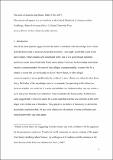Files in this item
The norm of assertion and blame
Item metadata
| dc.contributor.author | Brown, Jessica Anne | |
| dc.contributor.editor | Goldberg, Sanford C. | |
| dc.date.accessioned | 2021-02-11T00:32:33Z | |
| dc.date.available | 2021-02-11T00:32:33Z | |
| dc.date.issued | 2019-02-11 | |
| dc.identifier | 252008356 | |
| dc.identifier | 5920aa3b-c31b-4156-b6f9-00ff81a0fa40 | |
| dc.identifier.citation | Brown , J A 2019 , The norm of assertion and blame . in S C Goldberg (ed.) , Oxford Handbook of Assertion . Oxford University Press . https://doi.org/10.1093/oxfordhb/9780190675233.013.28 | en |
| dc.identifier.isbn | 9780190675233 | |
| dc.identifier.other | ORCID: /0000-0002-1149-4814/work/69029157 | |
| dc.identifier.uri | https://hdl.handle.net/10023/21405 | |
| dc.description.abstract | One of the most popular suggestions for the norm of assertion is the knowledge norm: one is in a good enough epistemic position to assert that p if and only if one knows that p. In the face of intuitive counterexamples to the norm, defenders have responded by appealing to the distinction between whether one conforms to a norm and whether one is blameworthy: one can violate a norm and yet be blameless or conform to it but nonetheless be blameworthy. Furthermore, some suggest that it’s futile to search for a norm such that whether one conforms to the norm aligns with whether one is blameless. They appeal to the failure of luminosity to defend the pessimistic conclusion that, for any norm whatsoever, the notions of norm conformity and being blameworthy can come apart. In this paper, the author assesses this defense of the knowledge norm of assertion. She criticizes the argument from the failure of luminosity to the pessimistic conclusion and argues that there is no easy way to reformulate it successfully. The discussion of the pessimistic conclusion distinguishes a variety of different explanations of how norm conformity can come apart from whether one is blameless, and the limitations of these explanations. Thus, it also provides some guidance on when it is reasonable to defend the knowledge norm of assertion against counterexample by appeal to the distinction between norm conformity and whether one is blameless. | |
| dc.format.extent | 393619 | |
| dc.language.iso | eng | |
| dc.publisher | Oxford University Press | |
| dc.relation.ispartof | Oxford Handbook of Assertion | en |
| dc.subject | Assertion | en |
| dc.subject | Knowledge norm | en |
| dc.subject | Blame | en |
| dc.subject | Blameworthy | en |
| dc.subject | Luminosity | en |
| dc.subject | B Philosophy (General) | en |
| dc.subject.lcc | B1 | en |
| dc.title | The norm of assertion and blame | en |
| dc.type | Book item | en |
| dc.contributor.institution | University of St Andrews. Philosophy | en |
| dc.contributor.institution | University of St Andrews. Arché Philosophical Research Centre for Logic, Language, Metaphysics and Epistemology | en |
| dc.identifier.doi | 10.1093/oxfordhb/9780190675233.013.28 | |
| dc.date.embargoedUntil | 2021-02-11 | |
| dc.identifier.url | http://doi.org/10.1093/oxfordhb/9780190675233.001.0001 | en |
This item appears in the following Collection(s)
Items in the St Andrews Research Repository are protected by copyright, with all rights reserved, unless otherwise indicated.

